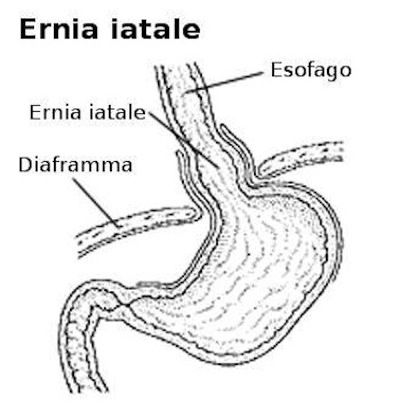Hiatal hernia: symptoms, causes, all the remedies

Hiatal hernia is a pathology that affects the stomach causing a portion of it to rise towards the thoracic cavity. What are the symptoms and how is it treated?
A hiatal hernia is the migration of a portion of the stomach into the thoracic cavity through the esophageal hiatus, which is the opening on the diaphragm that allows the passage of the esophagus. Let’s find out better.
> Types of hiatal hernia
> Symptoms of hiatal hernia
> Causes
> Diagnosis
> Treatment for hiatal hernia

Types of hiatal hernia
There are several types of hiatal hernia:
- Sliding hiatal hernia : This is the most common type, the hernia goes up and down, in and out of the chest cavity. These hernias are usually small and cause no problems or symptoms.
- Fixed (or paraesophageal) hiatal hernia: in this case the upper part of the stomach is trapped in the rib cage. Even in this situation, the symptoms can be negligible. However, you are more likely to have problems with your esophagus.
- Complicated or mixed hiatus hernia (rarer), in which the hernia can take on different forms, up to the extreme case in which the whole stomach forms a hernia in the rib cage. Surgery is most likely required for this type of hernia.
Symptoms of hiatal hernia
Hiatal hernia is generally an asymptomatic condition: the possibility of symptoms occurring depends on the presence of esophageal reflux .
In other cases it can instead manifest itself with symptoms of variable intensity, the most frequent of which is belching: since in fact a portion of the stomach rises towards the thoracic cavity, the organ tends to fill up with air frequently, generating a sense of heaviness. gastric pain which can lead to epigastric and thoracic pain.
In the most serious cases, these discomforts can come to simulate a myocardial infarction. Another, less frequent symptom may be the appearance of extrasystole, especially after meals.
Hiatal hernia is generally an asymptomatic condition: the possibility of symptoms occurring depends on the presence of esophageal reflux .
Complications that can be associated with the disorder include:
- chronic heartburn and chronic inflammation of the lower esophagus (reflux esophagitis);
- anemia , due to chronic bleeding from the lower esophagus;
- ulcers and narrowing of the lower esophagus, causing difficulty in swallowing.
Heartburn: Ever Tried Mallow?

Causes
There are no certain causes that determine the onset of hiatal hernia , but there are numerous factors that predispose to this pathology. Among these, without a doubt:
- Obesity and overweight
- Bad sitting posture
- Frequent cough
- Frequent tensions, upheavals and strains
- Old age
- Heredity and congenital defects, such as excessive opening of the esophageal hiatus
- Bad habits, such as smoking
Diagnosis
To diagnose the presence of a hiatal hernia, it is necessary to undergo an X-ray of the upper digestive system, or an endoscopy.
To perform the X-ray correctly, the patient will have to ingest a contrast liquid in order to make the stomach, esophagus and duodenum, the upper portion of the small intestine, clearly visible.
Endoscopy , on the other hand, takes place through the insertion of a flexible tube into the stomach orally. On the top of this very thin tube is a micro-camera, which will explore the esophagus and stomach, identifying any problematic situation.
A final diagnostic tool consists in measuring the pH of the esophageal contents during the day, or the internal pressure of the esophagus.
If the pH is too acidic or the internal pressure appears below normal, it is likely that the cause is the presence of a hiatus hernia.
CARE FOR THE IATAL HERNIA
Diet
It is very important to chew calmly . This factor is essential, because it allows you to contain the regurgitation and enjoy what you are taking .
Avoid (or use in moderation) substances that increase acid reflux into the esophagus, such as nicotine, caffeine, chocolate, high-fat foods, mint, alcohol. All carbonated drinks should also be excluded from the diet.
It is good to supplement the usual diet with fermented milk, kefir and natural yogurt enriched with probiotic bacteria.
Increase your daily intake of loquats , apricots, berries, papaya, asparagus , yellow squash, baked American sweet potatoes, and mangoes .
Eat light and more frequent meals and leave at least 2 or 3 hours between the meal and the time you go to sleep.
Find out more about proper nutrition to combat hiatal hernia

Herbal remedies for hiatal hernia
Fresh mint can be distributed on raw or cooked vegetables to facilitate digestive processes and avoid intestinal bloating.
The papaya fluid extract is also very useful , in the dose of 20 drops, twice a day, diluted in 2 tablespoons of pure blueberry juice , or raspberry , about 15 minutes before main meals.
Equally valid is the bitter orange , in the form of fluid extract, in the dose of 20 drops, twice a day, diluted in 2 tablespoons of celery and carrot smoothie .
You can also choose to dilute 15 drops of mugwort in two tablespoons of apple juice and drink three times a day, 15-20 minutes before meals.
Gastric function can be improved by taking yarrow in the form of a fluid extract, in the dose of 30 drops, three times a day, about 30 minutes before meals.
Normal dosage devil ‘s claw is generally well tolerated, even for long periods, especially if taken on a full stomach; however, it is not recommended to use it at excessive dosages, or at the same time as anti-inflammatory drugs, which could accentuate gastric damage.
Bach flowers
The Bach Sweet Chestnut flower is the most suitable in case of hiatal hernia, because it is very useful for the well-being of the stomach even in the presence of reflux and ulcer.
Aromatherapy remedies
To relieve esophageal spasms, peppermint essential oil can be used , 3 drops in a tablespoon of whole virgin lavender honey are enough , three times a day, about 10 minutes after the main meals.
Traditional Chinese medicine for hiatal hernia
Traditional Chinese medicine allows you to control the symptoms that participate in the hiatal hernia such as gastroesophageal reflux , gastric hyperacidity , meteorism . This is possible by working on points such as:
ZU SAN LI (under the lower edge of the patella, next to the anterior tibial crest), tones the Spleen and Stomach;
ZHONG WAN (4 cun above the navel), regulates the Stomach and dissolves Moisture;
IN GUAN (above the transverse crease of the wrist between the tendons), tones the Heart and Spleen;
WEI SHU (1.5 cun to the side of the spinous process of the XII thoracic vertebra), tones and regulates the Stomach.
Homeopathy
The homeopathic approach must be integrated with the evaluation and treatment recommended by the gastroenterologist specialist.
The remedies in case of hiatal hernia are: Argentum nitricum 9 CH – Ipeca 5 CH – Iris versicolor 7 CH (5 granules of each, alternating).
Together with this homeopathic preparation, Kali carbonicum 5 CH (5 granules, half an hour before meals) is also very suitable, it is the potassium carbon, ideal for digestive disorders and back pain.
Nux vomica 5 CH (5 granules, 3 times a day) relieves painful tension with burning, nausea, regurgitation.
Exercises for hiatal hernia
Avoid wearing tight-fitting clothes , tight belts and ventriere, as this will increase the pressure on the abdomen and cause reflux.
If you are overweight , it is good to start thinking about losing a few pounds with some healthy physical activity, especially if the fat puts pressure on the abdomen.
Raise the pillow about 20-30 centimeters, placing pillows or supports under the mattress. The force of gravity will allow you to keep acids away from the stomach during sleep.




























+ There are no comments
Add yours